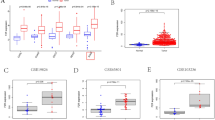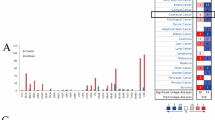Abstract
Nonsteroidal anti-inflammatory drugs possess antiproliferative activities that can affect cancer cells. The aim of this study was to examine the antiproliferative effects of ibuprofen on the MKN-45 cell line. Cells were treated with ibuprofen for 24, 48 or 72 h, and cell proliferation was evaluated by cell counting and [3H]-thymidine incorporation. Using microarray technology, we studied changes in the gene expression profiles over time after ibuprofen treatment. Ibuprofen induced a dose- and time-dependent reduction in cell number without altering cell viability. Genes involved in the ‘biological oxidation’ and ‘G1/S checkpoint’ pathways were the most significantly represented at 24 h, whereas genes involved in the ‘cell cycle’ and ‘DNA replication’ pathways were represented at 48 and 72 h. Genes associated with the ‘apoptosis’ pathway were also significantly represented at 72 h. Modulation of the expression of p53 and p53-induced genes (CDKN1A/p21 and GADD45), which are involved in the G1/S transition, suggested an effect of ibuprofen on cell-cycle progression. Using flow cytometry, we observed an early block in the G1 phase of the cell cycle after ibuprofen treatment. In addition, P450 family transcripts were upregulated and intracellular reactive oxygen species (ROS) was increased following 12 h of ibuprofen treatment. Ibuprofen induced ROS, which resulted in cellular alterations that promoted a p53-dependent G1 blockade. These findings suggest that ibuprofen exerts its antiproliferative actions through cell-cycle control and the induction of apoptosis. Both of these mechanisms appear to be independent of ibuprofen's anti-inflammatory effects.
This is a preview of subscription content, access via your institution
Access options
Subscribe to this journal
Receive 6 print issues and online access
$259.00 per year
only $43.17 per issue
Buy this article
- Purchase on Springer Link
- Instant access to full article PDF
Prices may be subject to local taxes which are calculated during checkout











Similar content being viewed by others
References
Hinz B, Brune K . Antipyretic analgesics: nonsteroidal antiinflammatory drugs, selective COX-2 inhibitors, paracetamol and pyrazolinones. Handb Exp Pharmacol 2007; 177: 65–93.
Kokoska ER, Smith G, Wolff AB, Deshpande Y, Miller TA . Nonsteroidal antiinflammatory drugs attenuate epidermal growth factor-induced proliferation independent of prostaglandin synthesis inhibition. J Surg Res 1999; 84: 186–192.
Thun AJ . NSAID use and decreased risk of gastrointestinal cancers. Gasteroenterol Clin North Am 1996; 25: 333–348.
Giardiello FM . NSAID-induced polyp regression in familial adenomatous polyposis patients. Gasteroenterol Clin North Am 1996; 25: 349–362.
Barnes CJ, Lee M . Non-steroidal anti-inflammatory drug effect on crypt cell proliferation and apoptosis during initiation of rat colon carcinogenesis. Gastroenterology 1998; 114: 873–877.
Fratelli M, Minto M, Crespi A, Erba E, Vandenabeele P, Del Soldato P et al. Inhibition of nuclear factor-kappaB by a nitro-derivative of flurbiprofen: a possible mechanism for antiinflammatory and antiproliferative effect. Antioxis redox Signal 2003; 5: 229–235.
Baron JA . Epidemiology of non-steroidal anti-inflammatory drugs and cancer. Prog Exp Tumor Res 2003; 37: 1–24.
Langman MJ, Cheng KK, Gilman EA, Lancashire RJ . Effect of anti-inflammatory drugs on overall risk of common cancer: case–control study in general practice research database. Br Med J 2000; 320: 1642–1646.
Wang WH, Huang JQ, Zheng GF, Lam SK, Karlberg J, Wong BC . Non-steroidal anti-inflammatory drug use and the risk of gastric cancer: a systematic review and meta-analysis. J Natl Cancer Inst 2003; 95: 1784–1791.
Giovannucci E, Egan KM, Hunter DJ . Aspirin and the risk of colorectal cancer in women. N Engl J Med 1995; 333: 609–614.
de Groot DJ, de Vries EG, Groen HJ, de Jong S . Non-steroidal anti-inflammatory drugs to potentiate chemotherapy effects: from lab to clinic. Crit Rev Oncol Hematol 2007; 61: 52–69.
Palayoor ST, Tofilon PJ, Coleman CN . Ibuprofen-mediated reduction of hypoxia-inducible factors HIF-1a and HIF-2a in prostate cancer cells. Clin Cancer Res 2003; 9: 3150–3157.
Janssen A, Majer TJ, Schiffmann S, Coste O, Seegel M, Geisslinger G et al. Evidence of COX-2 independent induction of apoptosis and cell cycle block in human colon carcinoma cells after S- or R-ibuprofen treatment. Eur J Pharmacol 2006; 540: 24–33.
John-Aryankalayil M, Palayoor ST, Cerna D, Falduto MT, Scott R, Coleman CN . NS-398, ibuprofen, and cyclooxygenase-2 RNA interference produce significantly different gene expression profiles in prostate cancer cells. Mol Cancer Ther 2009; 8: 261–273.
Raju U, Nakata E, Yang P, Newman RA, Ang KK, Milas L . In vitro enhancement of tumor cell radiosensitivity by a selective inhibitor of cyclooxygenase-2 enzyme: mechanistic considerations. Int J Radiat Oncol Biol Phys 2002; 54: 886–894.
Minter HA, Eveson JW, Huntley S, Elder DJ, Hague A . The cyclooxygenase 2-selective inhibitor NS398 inhibits proliferation of oral carcinoma cell lines by mechanisms dependent and independent of reduced prostaglandin E2 synthesis. Clin Cancer Res 2003; 9: 1885–1897.
Palayoor ST, Youmell MY, Calderwood SK, Coleman CN, Price BD . Constitutive activation of IκB kinase α and NF-κB in prostate cancer cells is inhibited by ibuprofen. Oncogene 1999; 18: 7389–7394.
Andrews J, Djakiew D, Krygier S, Andrews P . Superior effectiveness of ibuprofen compared with other NSAIDs for reducing the survival of human prostate cancer cells. Cancer Chemother Pharmacol 2002; 50: 277–284.
Tegeder I, Pfeilschifter J, Geisslinger G . Cyclooxygenase-independent actions of cyclooxygenase inhibitors. FASEB J 2001; 15: 2057–2072.
Masferrer JL, Leahy KM, Koki AT, Zweifel BS, Settle SL, Woerner BM et al. Antiangiogenic and antitumor activities of cyclooxygenase-2 inhibitors. Cancer Res 2000; 60: 1306–1311.
Livak KJ, Schmittgen TD . Analysis of relative gene expression data using real-time quantitative PCR and the 2−ΔΔCt method. Methods 2001; 25: 402–408.
Takada Y, Bhardwaj A, Potdar P, Aggarwal BB . Nonsteroidal anti-inflammatory agents differ in their ability to suppress NF-kappaB activation, inhibition of expression of cyclooxygenase-2 and cyclin D1, and abrogation of tumor cell proliferation. Oncogene 2004; 23: 9247–9258.
Thurnher D, Bakroeva M, Formanek M, Knerer B, Kornfehl J . Non-steroidal anti-inflammatory drugs inhibit telomerase activity in head and neck squamous carcinoma cell lines. Head Neck 2001; 23: 1049–1055.
Sawaoka H, Kawano S, Tsujii M, Gunawan ES, Takei Y, Nagano K et al. Cyclooxygenase-2 inhibitors suppress the growth of gastric cancer xenografts via induction of apoptosis in nude mice. Am J Physiol 1998; 274: 1061–1067.
de Groot DJ, de Vries EG, Groen HJ, de Jong S . Non-steroidal anti-inflammatory drugs to potentiate chemotherapy effects: from lab to clinic. Crit Rev Oncol Hematol 2007; 61: 52–69.
Redpath M, Marques CM, Dibden C, Waddon A, Lalla R, Macneil S . Ibuprofen and hydrogel-released ibuprofen in the reduction of inflammation-induced migration in melanoma cells. Br J Dermatol 2009; 161: 25–33.
Quann EJ, Khwaja F, Djakiev D . The p38 MAPK pathway mediates aryl propionic acid induced messenger RNA stability of p75 NTR in prostate cancer cells. Cancer Res 2007; 67: 11402–11410.
Ekholm SV, Reed SI . Regulation of G(1) cyclin-dependent kinases in the mammalian cell cycle. Curr Opin Cell Biol 2000; 12: 676–684.
Viallard JF, Lacombe F, Belloc F, Pellgrin JL, Reiffers J . Molecular mechanisms controlling the cell cycle: fundamental aspects and implications for oncology. Cancer Radiother 2001; 5: 109–129.
Waldman T, Kinzler KW, Vogelstein B . P21 is necessary for the p53-mediated G1 arrest in human cancer cells. Cancer Res 1995; 55: 5187–5190.
Cam H, Dynlacht BD . Emerging roles for E2F: beyond the G1/S transition and DNA replication. Cancer Cell 2003; 3: 311–316.
Chandra D, Liu JW, Tang DG . Early mitochondrial activation and cytochrome c up-regulation during apoptosis. J Biol Chem 2002; 277: 50842–50854.
Acknowledgements
We thank Microgem s.r.l. for support and help with statistical analysis. This work was funded in part by Ricerca Corrente.
Author information
Authors and Affiliations
Corresponding author
Ethics declarations
Competing interests
The authors declare no conflict of interest.
PowerPoint slides
Rights and permissions
About this article
Cite this article
Bonelli, P., Tuccillo, F., Calemma, R. et al. Changes in the gene expression profile of gastric cancer cells in response to ibuprofen: a gene pathway analysis. Pharmacogenomics J 11, 412–428 (2011). https://doi.org/10.1038/tpj.2010.55
Received:
Revised:
Accepted:
Published:
Issue Date:
DOI: https://doi.org/10.1038/tpj.2010.55



